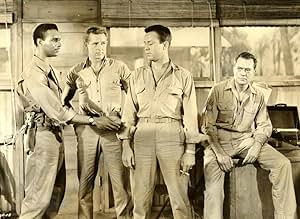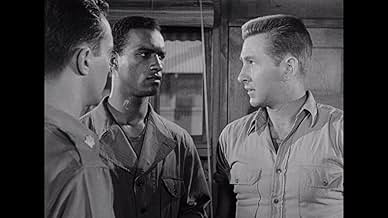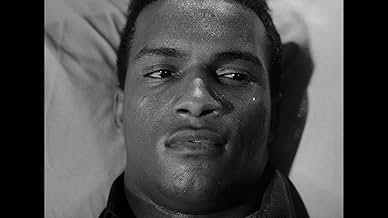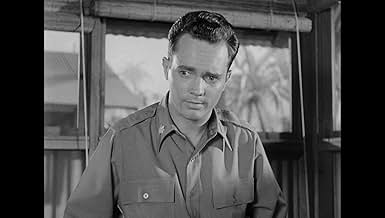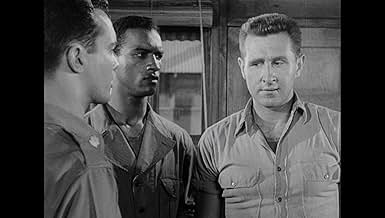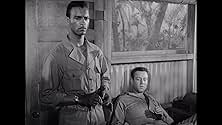Füge eine Handlung in deiner Sprache hinzuDuring WW2, a reconnaissance platoon is sent to map out a Japanese-held island but racial tensions arise between the white soldiers and the only black member of the group.During WW2, a reconnaissance platoon is sent to map out a Japanese-held island but racial tensions arise between the white soldiers and the only black member of the group.During WW2, a reconnaissance platoon is sent to map out a Japanese-held island but racial tensions arise between the white soldiers and the only black member of the group.
- Auszeichnungen
- 3 Gewinne & 2 Nominierungen insgesamt
Empfohlene Bewertungen
The irony is Mr. Edwards' last film, PATTON, has him portraying a valet. The insult is that Patton's most important victory - The Battle of The Bulge - was facilitated in great part by the contribution of The Big Red One - a battalion of Black truck drivers - who risked all to keep Patton's front supplied until the weather cleared enough to allow cargo flights. This historic fact (the race of the drivers in this segregated unit) is ignored in the film leaving Mr. Edwards with the only Black speaking part in a sweeping biography about a WWII general - isn't this where we came in?
If you examine Mr. Edward's filmography (by which I mean screen the films) it is difficult to understand the spottiness of his career and his relative obscurity. Part of the explanation may lie in the murky machinations of HUAC, McCarthyism, the Hollywood Blacklist and Mr. Edwards' worldwide tour with this film (it included a stop in the then Soviet Union). If you have any information regarding this aspect of his life please post it here.
CeOTIS
The action takes place on a nameless islands in the Pacific during World War II. In the opening scenes,a psychiatrist(Jeff Corey)tries to find out how Peter Moss(James Edwards),a black soldier,came to be paralyzed from the waist down. Moss is also amnesiac and so he can't remember what happened to him on his last mission. Major Robinson(Douglas Dick),and Mingo(Frank Lovejoy)tell the doctor what they know. They say that it was a reconnaissance patrol to an island held by the Japanese. Robinson picked Mingo,Finch(Lloyd Bridges),and T.J. Everett (Steve Brodie) to "volunteer" from his outfit. He had recruited Moss,an engineer from another division,to make maps of the island. Robinson was then surprised to learn that Moss was "colored." T.J. is openly racist,but it turns out that Finch and Moss are old pals from high school,where they played basketball together. Tensions within the group rise to the surface and explodes as soon as they're dropped on the island to face the enemy. And against each other.
Neither the depiction of jungle warfare nor the racial attitudes are remotely believable. Men on sentry duty at night chatter away like schoolchildren and smoke cigarettes constantly. T.J.'s expressions of racism and Moss's reactions are equally simplistic and false. And when,finally,the reasons for the paralysis are revealed,audiences today will groan in disbelief,which shocked audiences who went to see this picture in 1949. The resolution of the conflicts piles improbability upon improbability. That said,the filmmakers to deserve credit for addressing racial issues at a time when the entertainment industry generally ignored them,and when segregation was the law of the land. The year 1949 introduced not only this picture,but also another picture,Elia Kazan's "Pinky" that also address the issue of racism and segregation as well. As with "Home Of The Brave",the active recruitment of black soldiers,sailors,and airmen during World War II played a huge part in changing that,and the stories of that change have yet to be fully told. This movie was a small first step in addressing the issue of racism in America during the 1940's.
Wusstest du schon
- WissenswertesThis was the first Hollywood movie to be officially be permitted to use the word "nigger" after The Emperor Jones (1933). Previously, the Hays Code had forbidden it since 1934.
- PatzerThe Army Recon Team's helmets are fitted with manufactured camouflaged covers. In W.W.II, these were strictly a Marine Corps- issued item.
- Zitate
Mingo: Yeah, I'll never forget the first letter I got from my wife. It started, "My darling, darling, darling, I'll never again use the word 'love' without thinking only of you." And I remember the last one I got from her. It started, "Dear T.J., this is the hardest letter I've ever had to write."
- Crazy CreditsThe initial credits play over actual footage of battles from the Pacific campaign.
- VerbindungenEdited into Dynamite Chicken (1971)
- Soundtracks(Sometimes I Feel Like a) Motherless Child
Traditional
Top-Auswahl
- How long is Home of the Brave?Powered by Alexa
Details
Box Office
- Budget
- 375.000 $ (geschätzt)
- Laufzeit1 Stunde 28 Minuten
- Farbe
- Seitenverhältnis
- 1.37 : 1
Zu dieser Seite beitragen


